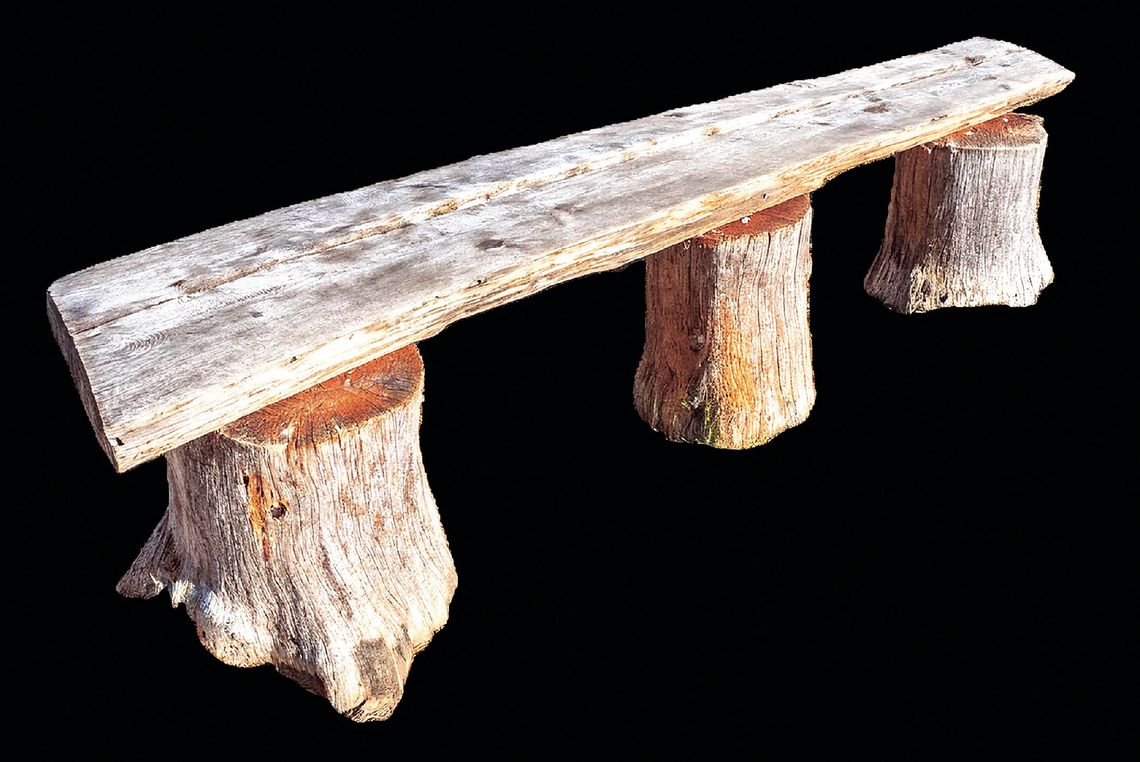Program, Book Present History Of Glasgow Icon
Editor’s note: The following story was written by Eric Wilson, executive director of the Rockbridge Historical Society, with support by Penny Dudley, Rockbridge Regional Library, in advance of their Feb. 22 program described below.
“On the corner of Catawba Street and 4th Street sits a bench that is a meeting place for men, but mostly Negro men. Occasionally, women would come there, but they wouldn’t stay long. I believe they are made to feel that they are not welcome there. I sat there but not long because Mr. Smitty told me this was not the place for young ladies when I was about 13. I got up and left. I was somewhat embarrassed, so I imagined they told other women or girls similar things.”
The stage is set here, in this opening paragraph of a newly published novel, for a free public program on Saturday, Feb. 22, titled “Bond of Friendship: The Crows’ Post.”
After centering her opening lines on that bench, Glasgow native Maxine Mays Gray zooms out to see things from a bird’s eye view, then perches back down for a closer listen. The tales and characters that follow highlight broader themes that connect us all, exploring the play of easy banter and testy rivalries, competing social networks, the charms and challenges of everyday talk, of trusted friendship.
In vivid dialect and authentic detail, a chorus emerges from the well-worn grain of that wooden bench: the accompanying grain and rhythm of the voices of men who
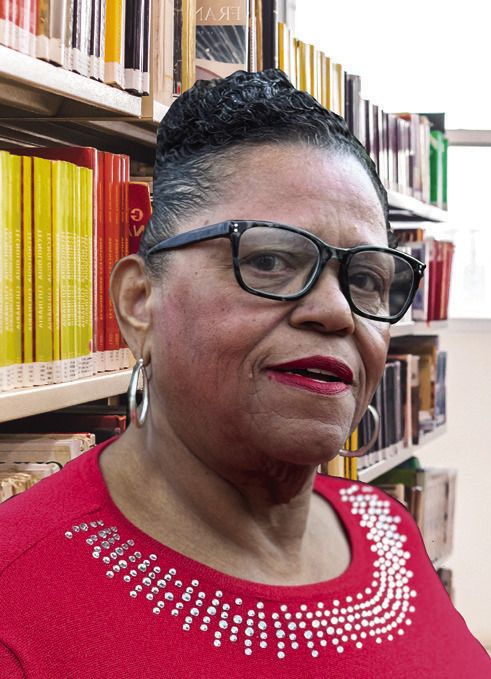
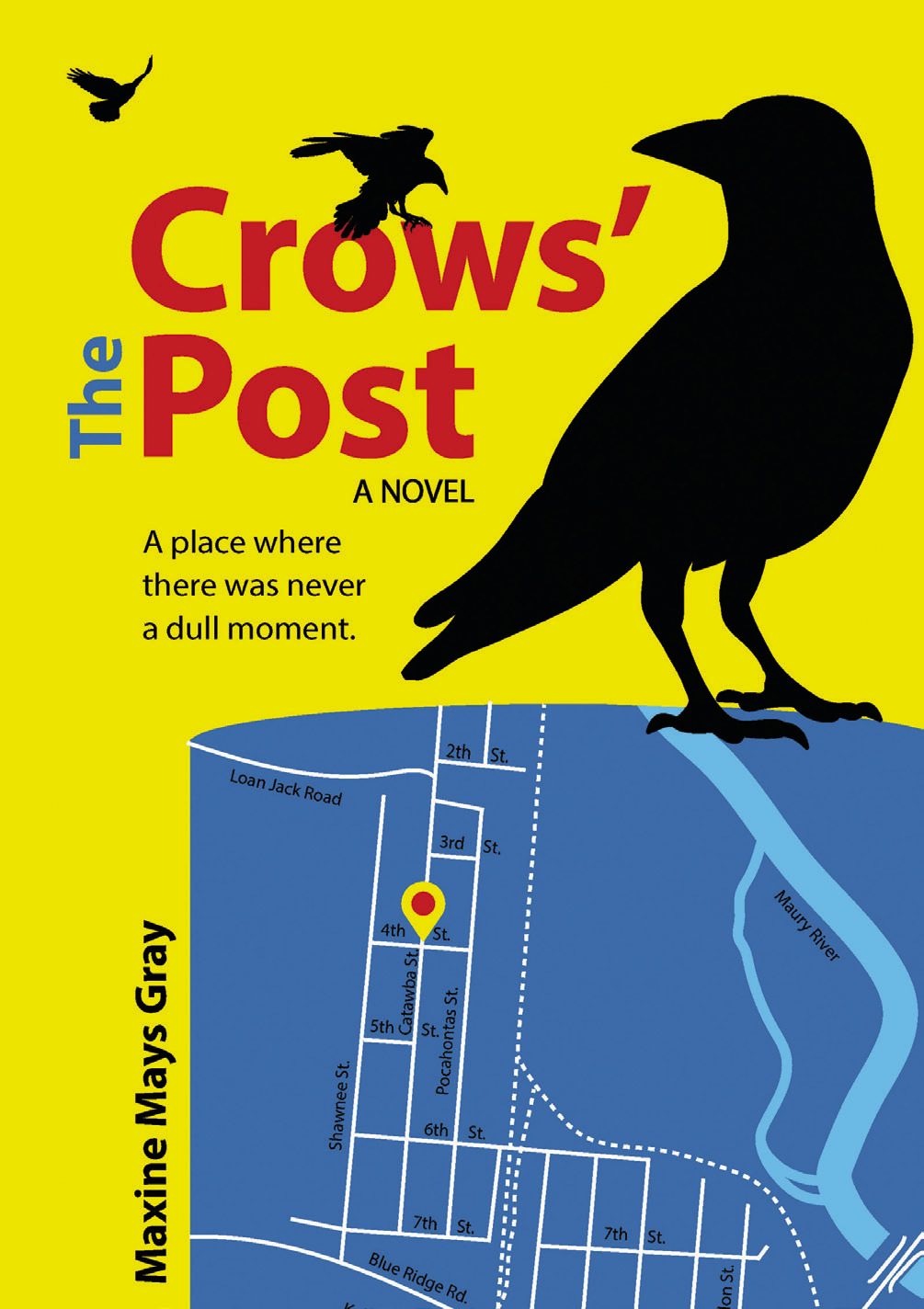
GLASGOW native and former manager of the Glasgow Library Maxine Mays Gray (pictured at top) has just published a novel that centers around “The Crows’ Post,” a gathering place for African American men in Glasgow during the mid-20th century. The map on the book cover (at right) points to its former location on Catawba Street. Above is a digital rendering of the replica bench being returned to its original setting on loan donated by Maurice Sledd. It will be dedicated after the program, then placed at the original Crows’ Post site at Catawba and 4th streets, Glasgow. (images courtesy of Penny Dudley) gathered there, in a very particular neighborhood in southern Rockbridge County, while still characteristic of the mid-20th century, small-town South. Gray’s episodes are based on real histories and known figures, but her fictional exposition sounds chords that are more universal, yet specific enough to compel curiosity: “Other countries, towns, or cities may have identical places for men to air out their dirty laundry, not just theirs but others. Such places in other towns may be backyards, neighborhood bars, barbershops, pool halls, or juke joints. The spot in Glasgow is the Crows’ Post.
“Men love going there. They spend hours there. They are drawn there like someone is pulling them in with a magnetic force and preventing them from leaving. The juicier the stories got, the more compelled they were to stay. It doesn’t matter if the weather is favorable; they would be there.
“Something inside the men forces them to gather together, to either listen to or talk about everything and anything that occurs behind closed doors or in the open fields of Glasgow.” - You can hear the author read more from her novel at Saturday’s 1 to 2 p.m. program. Fittingly, it will be held at Glasgow’s Thompson Community Center, two blocks from where that bench once sat on Catawba Street.
The program mixes a range of speakers and styles. Organizer Penny Dudley, manager of the Rockbridge Regional Library’s Local History Center, has sought to complement and connect voices of those who lived in North Glasgow during these years with descendants who’ve heard similar stories (the novel is nominally set in 1953, but spools back in time, and ahead). Other community partners and contributors include representatives from the Rockbridge Historical Society, Concerned Citizens of Glasgow, Union Baptist Church, St. John’s Episcopal Church, Glasgow Town Council, W.R. Deacon & Sons, and Natural Bridge Elementary School.
Gray’s own readings will be complemented by personal reflections from several others, and an open mic for audience contributions. You’ll also hear poems about friendship written by students selected as winners from a school contest at NBES. A booksigning will close the event, with inaugural sales of Gray’s novel available for purchase onsite. Finally, a newly finished replica of the original Crows’ Post bench will be dedicated and installed by a local pastor and Glasgow’s mayor, accompanied by some of the very men who’d once sat there, enriched their days, and enlivened their community.
On the one hand, the program provides a vivid and varied portrait of local history. It builds on the pair of Black History Month programs in 2023 and 2024 (“Bond of Family” and “Bond of Faith”) organized by the library’s Local History Center and a range of institutional partners, neighbors, and descendants; as well as the Rockbridge Historical Society’s 2022 program on “Glasgow Histories: Voices and Visions.”
To best frame her creative enterprise within the orbits of local history, I had a series of conversations with Gray over recent weeks. We discussed her writing process, as well as the histories that she personally remembered as a child, had relayed to her, and has continued to learn about since moving back to Glasgow in 1980. - Right off the bat, it was striking that the Crows’ Post was, quite clearly, not for women. This perch was a dedicated space for men. It was their protected space, whatever their wives, their female friends and co-workers, their fellow congregants or other women in the neighborhood may have thought about it ... and all the doings discussed there.
“Men on the Crows’ Post are like flies now that I think of it,” Gray’s narrator continues. “I believe that just about all men in that community, at one time or another, have spent time at that spot. Some wouldn’t stay as long because they desired not to be considered a part of the negativity. Men were going to be there regardless.
“Wives, girlfriends, mothers, or preachers couldn’t keep them away from that addictive hangout spot. I’m not judging them or saying that being there is good or bad. I will say, though, that I don’t think they’ll get to heaven by participating in the goings-on there.”
While the book’s characters bear different names than the known residents and storytellers, Gray’s voice remains distinctly local, with the characteristic speech and concerns of the mid-20th century (although the bench is known to have stayed on Catawba Street until at least the 1980s). Familiar street corners, the textile factory, churches, and other bygone stores and sites can still be recognized, some warmly remembered, from these pages. - Last week, Gray shared that she wrote her book both as a promise to her late husband, and as a gift – and continued charge – to be passed on to younger generations. In effect, like many other residents, descendants, and parents who’ll be sharing from the podium, she’s paying it forward.
In complementing broader American histories with a blend of family and oral histories, Gray notes that her fictional rendering seeks to honor the generations of men who gathered at the Post, for their own range of reasons: in an era where the terms of Jim Crow, and the terms of the workplace, did not afford them a full range of voice, in wider settings.
In November 1940, Maxine Mays Gray’s grandfather Charles Hartwill became the very first man from Rockbridge to be drafted for World War II. A public ceremony was held at the courthouse to honor his service. He is pictured proudly in uniform at age 31, back in Glasgow with his wife, shortly after his initial training, nearly a year still before Pearl Harbor. And yet, this book emerged as an important means to both acknowledge his voice and those of his contemporaries – in ways that had not been broadly recorded – and to credit their influence on others, and on her. Gray writes: “I dedicate The Crows’ Post to my grandparents, Charles and Pauline Hartwill, who raised me and taught me I could do anything, and to my husband, Walter Gray, Sr. (Bob), who believed I could.” For more information, see the Rockbridge Regional Library Facebook page, or rrlib.net/ contact-us/#mail.
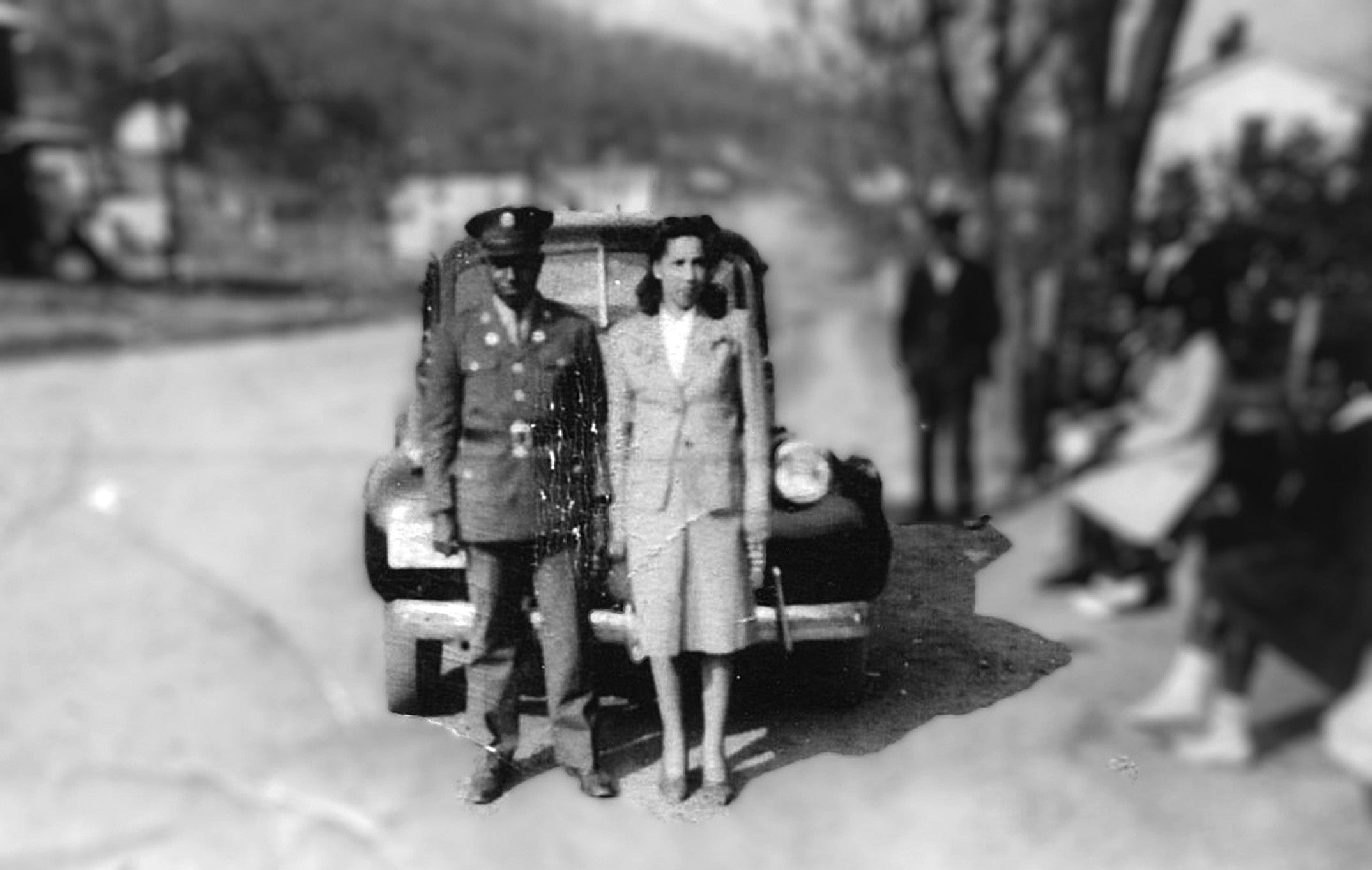
THE EXPERIENCES and stories of the author’s grandparents, Charles and Pauline Hartwill, provided inspiration for her fictional rendering of her town’s local histories and characters. In 1940, over a year before Pearl Harbor, he became the first inductee from Rockbridge for World War II, honored with a ceremony at the courthouse, and pictured here in front of the Crows’ Post early in 1941. (photo courtesy of Maxine Mays Gray)
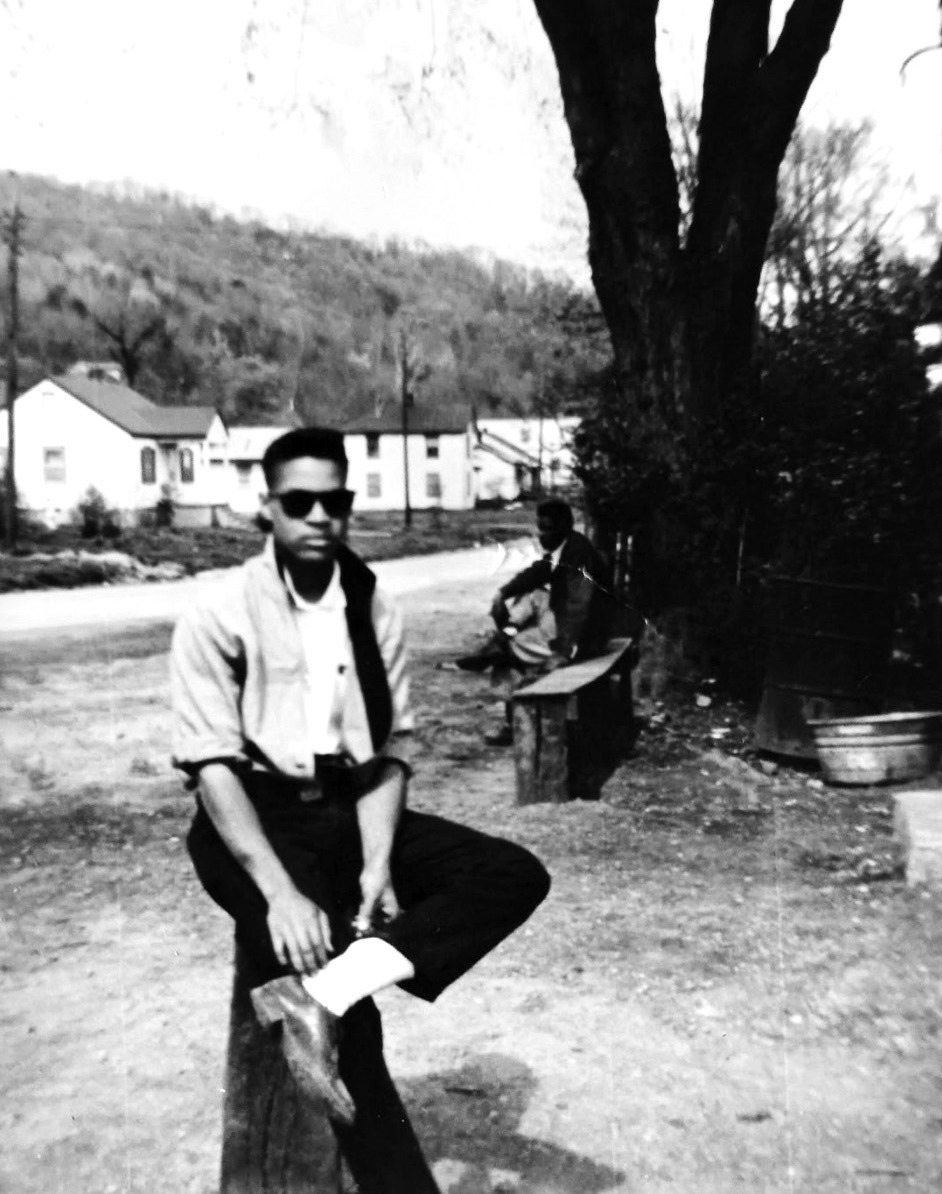
THE ORIGINAL BENCH at the Crows’ Post can be seen in the background of this picture, with an unidentified man. In the foreground is Glasgow resident Donald Wayne Early, one of the men who will be on hand for the dedication of a new replica bench, to cap the Feb. 22 program at the Thompson Center, two blocks away. (photo courtesy of Maxine Mays Gray)
.jpg)
